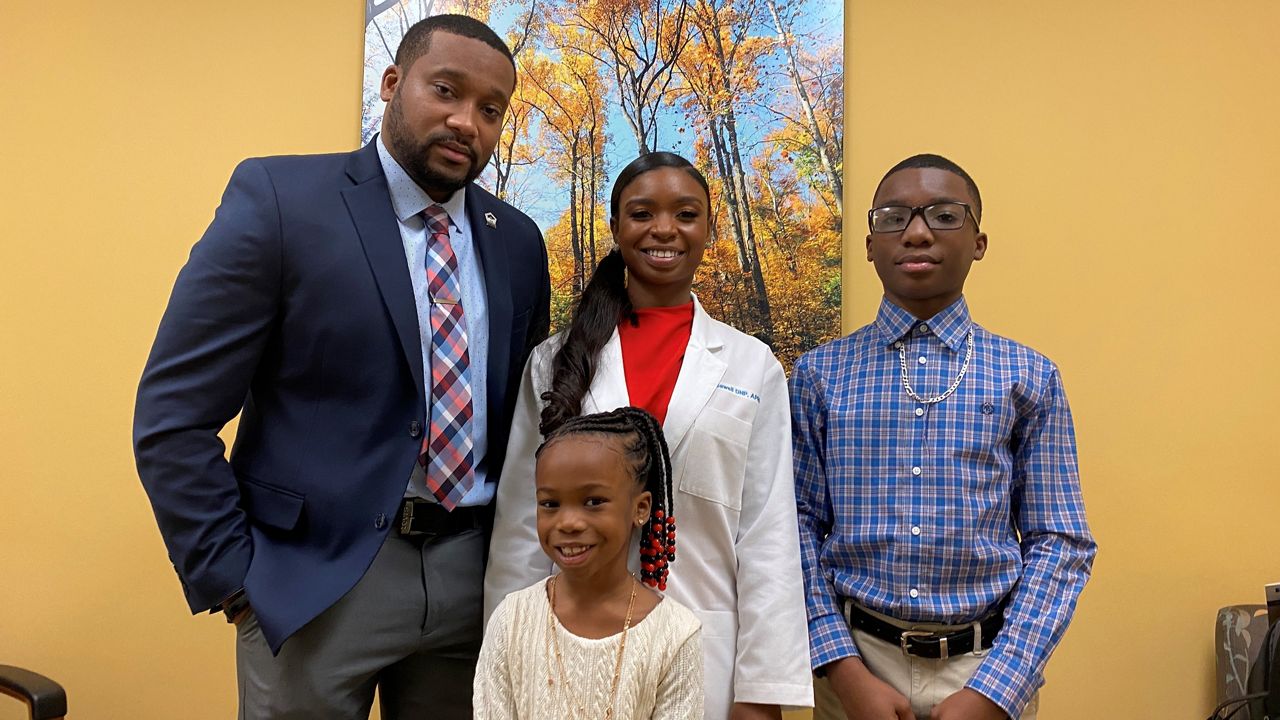LOUISVILLE, Ky. — With work, sports, and school, the Sewell family is a busy family, but no matter how busy life gets, they make room for family time.
What You Need To Know
- Melanated Healthcare aims to decrease health disparities while increasing access to care
- Users can connect with health providers that look like them and share their culture and experiences
- The app was created by Lecresha Sewell, a Louisville wife, mom and women’s health practitioner
- The app launched in May 2021
They enjoy spending time together travelling, eating and playing board games together.
If it were up Rylee Sewell, the daughter and youngest member of the family, they would always play the same game.
“I like to play Minecraft. You can create and build,” says Rylee.
That’s something Rylee may have picked up from her mom Lecresha Sewell, a women’s health practitioner who has created and built her own app, Melanated Healthcare.

Melanated Healthcare is a digital health platform that connects Black and brown patients with Melanated Healthcare professionals.
Melanated Healthcare provides a directory for people of color to find health providers who look like them and understand their culture and experiences.
The app aims to eliminate health care disparities that Sewell has witnessed since launching her nursing career in high school. Black Americans are more likely to die at early ages than white Americans from multiple conditions, including high blood pressure, diabetes, and strokes, according to the CDC.
“All disparities are preventable. In the United States, annually, health disparities costs about $93 billion, so it is a major issue,” says Sewell. “Black women especially are two to three times more likely to die from a pregnancy-related complication, regardless of socioeconomic status in the United States, compared to white women so making it very transparent there is a major issue there,” says Sewell.
Sewell says her experience with her doctor while pregnant with her first child, Amaris, influenced her decision to advance in her career and her desire to educate patients the way she wanted to be educated.
“I just didn’t have a connection with that provider. It was kind of like just cold. Not really a warm feeling and just kind of navigating that unknown space,” says Sewell.
Ana’neica Williams wishes the resource was available during her high-risk pregnancy so she could have found a provider she felt connected with.
“No one ever asked me mentally. ‘How are you doing?’ Had that had happened, I think that there could have been some different outcomes for me,” says Williams.
The app has changed how Williams finds care for herself and her now 11-year-old daughter.
“I’ve never had a provider that is of color that’s a dentist. The app has allowed me to find one,” says Williams. “Sometimes you want somebody that I don’t have to explain to you my culture. I don’t have to explain to you what a certain language means. It’s almost like a reunion. You go with your family and you’re able to just embrace one another.”
Williams is a clinical social worker and owner of Momology Maternal Wellness Club. She also uses the app to connect with clients and help them build their team of providers.
“People want to know that you care. That’s what this app allows them to do. Connect, see someone who looks like them, reach out, build the relationship,” says Williams. “A lot of my moms come to me pregnant. Let’s look on here and identify a doula or I can reach out to the doula. We can do it together and that’s really how you build community.”
The app includes a chat and blog feature to discuss and share health-related information.
“I really hope that we are helping patients connect with people that they feel comfortable with, and really improving health outcomes, which is the ultimate goal for what we’re doing,” says Sewell.
Sewell hopes the app leads to more people trusting the health care system instead of avoiding care which affects life expectancy.
“Avoiding care can be costly, so costly that it could cost your life. A lot of people they don’t seek care until something truly happens and oftentimes is too late, “ says Sewell. “I highly encourage people to establish with someone that they are comfortable enough to allow them to care for them and make sure that they are the healthiest possible and live as long as they possibly can.”
Melanated Healthcare is available in the App store and Google Play.
Editor's note: In a previous version of this story Lecresha Sewell's last name was misspelled in the caption, her daughter Rylee's name was misspelled and her first child was incorrectly identified. All of the errors have been corrected. Our apologies for the errors.

